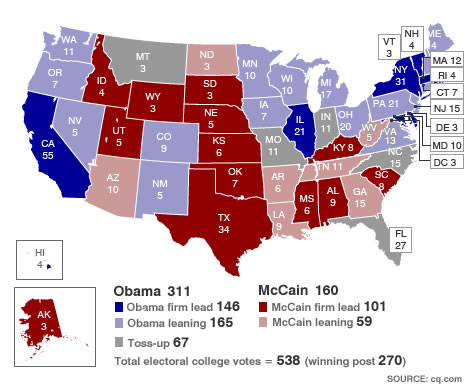Washington, District of Columbia 20001
Is the Electoral College Obsolete?
Washington, District of Columbia 20001
Federalism & Separation of Powers Practice Group
 The Electoral College has been a staple of American presidential elections since the nation's founding, but it may not be for long: a new legislative effort has been gaining momentum in state legislatures and could soon fundamentally change presidential elections as we know them. A California-based group, National Popular Vote, hopes to convince a critical mass of state legislatures to sign an interstate compact that will dictate a new method of allocating presidential electors: rather than states allocating electors as they do now, NPV wants states to give their electors to the winner of the national popular vote. The compact has been approved in five states (61 electoral votes) and is currently being considered in three other states (46 electoral votes). Three additional state legislatures approved the compact but did not receive gubernatorial approval (62 electoral votes). The compact goes into effect when states holding 270 electoral votes have signed the agreement. At this critical moment in the progress of NPV's legislation, Ms. Ross and Dr. Koza will debate the benefits and detriments of both NPV and the Electoral College. Should the Electoral College be retained? If not, is NPV's solution a good one, or might there be unintended logistical ramifications? Should Electoral College opponents instead go through the formal constitutional amendment process?
The Electoral College has been a staple of American presidential elections since the nation's founding, but it may not be for long: a new legislative effort has been gaining momentum in state legislatures and could soon fundamentally change presidential elections as we know them. A California-based group, National Popular Vote, hopes to convince a critical mass of state legislatures to sign an interstate compact that will dictate a new method of allocating presidential electors: rather than states allocating electors as they do now, NPV wants states to give their electors to the winner of the national popular vote. The compact has been approved in five states (61 electoral votes) and is currently being considered in three other states (46 electoral votes). Three additional state legislatures approved the compact but did not receive gubernatorial approval (62 electoral votes). The compact goes into effect when states holding 270 electoral votes have signed the agreement. At this critical moment in the progress of NPV's legislation, Ms. Ross and Dr. Koza will debate the benefits and detriments of both NPV and the Electoral College. Should the Electoral College be retained? If not, is NPV's solution a good one, or might there be unintended logistical ramifications? Should Electoral College opponents instead go through the formal constitutional amendment process?
Co-sponsored with The Cato Institute's Center for Constitutional Studies
This event is being webcast live.
To watch the live webcast, visit http://www.cato.org/event.php?eventid=7349.
 The Electoral College has been a staple of American presidential elections since the nation's founding, but it may not be for long: a new legislative effort has been gaining momentum in state legislatures and could soon fundamentally change presidential elections as we know them. A California-based group, National Popular Vote, hopes to convince a critical mass of state legislatures to sign an interstate compact that will dictate a new method of allocating presidential electors: rather than states allocating electors as they do now, NPV wants states to give their electors to the winner of the national popular vote. The compact has been approved in five states (61 electoral votes) and is currently being considered in three other states (46 electoral votes). Three additional state legislatures approved the compact but did not receive gubernatorial approval (62 electoral votes). The compact goes into effect when states holding 270 electoral votes have signed the agreement. At this critical moment in the progress of NPV's legislation, Ms. Ross and Dr. Koza will debate the benefits and detriments of both NPV and the Electoral College. Should the Electoral College be retained? If not, is NPV's solution a good one, or might there be unintended logistical ramifications? Should Electoral College opponents instead go through the formal constitutional amendment process?
The Electoral College has been a staple of American presidential elections since the nation's founding, but it may not be for long: a new legislative effort has been gaining momentum in state legislatures and could soon fundamentally change presidential elections as we know them. A California-based group, National Popular Vote, hopes to convince a critical mass of state legislatures to sign an interstate compact that will dictate a new method of allocating presidential electors: rather than states allocating electors as they do now, NPV wants states to give their electors to the winner of the national popular vote. The compact has been approved in five states (61 electoral votes) and is currently being considered in three other states (46 electoral votes). Three additional state legislatures approved the compact but did not receive gubernatorial approval (62 electoral votes). The compact goes into effect when states holding 270 electoral votes have signed the agreement. At this critical moment in the progress of NPV's legislation, Ms. Ross and Dr. Koza will debate the benefits and detriments of both NPV and the Electoral College. Should the Electoral College be retained? If not, is NPV's solution a good one, or might there be unintended logistical ramifications? Should Electoral College opponents instead go through the formal constitutional amendment process?
Featuring:
- Dr. John R. Koza, Chairman, National Popular Vote Inc.
- Ms. Tara Ross, Author, Enlightened Democracy: The Case for the Electoral College
- Moderator: Dr. Roger Pilon, Vice President for Legal Affairs, Cato Institute
This event is being webcast live.
To watch the live webcast, visit http://www.cato.org/event.php?eventid=7349.
News media inquiries only (no registrations), please call (202) 789-5200.
If you can't make it to the Cato Institute, watch this Forum live online at www.cato.org.

